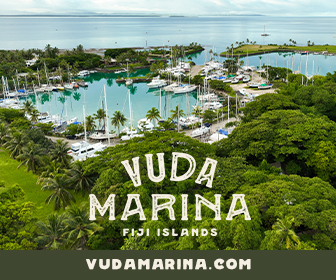Kava – Southern Pacific way of life
Published 15 years ago, updated 6 years ago
Again, our thanks to Rune Kr. Ellingsen for a most interesting article.
PORT VILA, VANUATU: Forget khat. Forget marihuana. In the desolate jungle areas on the islands of the Southern Pacific, the mildly narcotic drink of kava is very popular. The bitter tasting juice made from plant roots looks and tastes like muddy water, but it gives the user a quiet, relaxed feeling of happiness. Many people there drink kava every night, due to a lack of other ways of entertaining themselves.
Kava is legal to import, buy and use in most countries in the world, making it one of the last legal narcotic substances around.
Sluuuurp! It may not taste so good, but you get used to it, local MacClory Kalsaku Ifira (58) says and smiles coyly at us. He has just downed a bowl of the narcotic drink kava. Bottoms up. The effect kicks in immediately. Tongue and lips go numb, and a sense of relaxation hits the body.
Three – four bowls like this will suffice for a grown man, he assures us. A cheap and simple way of getting high, in other words.
To be drunk in darkness
Kava is better enjoyed in special, designated places called “nakamal”. We are at ”Ronnies Nakamal” in the capital Port Vila. We have been told that “Ronnies” is the best in town, and the place is already crowded when we arrive, even though it is only a regular Tuesday afternoon. Kava is supposed to be drunk after nightfall, as your eyes go very light sensitive, and the kava experience is more intense in darkness. It is also supposed to be quiet, and neither music nor loud voices are heard among the roughly 50 people sitting around tables and talking to each other quietly. The age limit for drinking kava is 18 years. In earlier times, kava drinking was an exclusively male activity, but today also women enjoy kava drinking. A bowl of kava costs roughly 50 pence in Vanuatu. Many isolated tribal communities are still hunter-gatherer societies, who base themselves mainly on the natural household. For these, kava production is the only way they can make some money to pay for school books, medicines and other necessities of life.
Many people drink kava every night. In the long run, this is unfortunate, you can acquire stomach problems and characteristic skin disease. In addition, you can grow apathetic and lose your ability to focus, says MacClory. He works as an architect and declares that he tries to limit his kava drinking to 2-3 times a week. People from all walks of life gather in the nakamals in Port Vila every night after sunset.
The production of kava is a labour-intensive, but uncomplicated process. The kava tree is cut down, and only the roots are usable for kava. These are cut into little pieces and laid out to dry for a couple of hours, before being minced up in a meat grinder to a porridge called “makas”. This is mixed with a certain amount of water and left to stand for half an hour. The kava now looks like brown wallpaper glue and smells like old sawdust. Then it is filtered through a piece of cloth. The fluid coming through the filter is kava ready for consuming.
Kava is a fresh product. It has to be consumed the same evening as it was made. The next day it is too bitter by taste and has lost its effect. It is also important to drink kava on an empty stomach, and drink every bowl straight down, to get the maximum effect, MacClory explains. Seven kilos of root material is mixed with ten litres of water and makes 13 litres of kava. The leftovers from this process can be used one more time, but this kava will have a weaker effect.
Export Trade
Kava is big business in Vanuatu, but no one knows exactly how much is produced every year for domestic use. In 2008, around 450 tons of kava was exported, mainly to Fiji, the USA and New Caledonia.
Kava is a very important export product. It is very popular in the USA, where it is used as a nerve and tranquillizing medicine. Several international companies are engaged in research to establish out how to isolate the narcotic element from the kava and utilize it in the production of pills.
The price of kava has quadrupled in recent years, and Vanuatu has increased its production of kava trees. So in a year or two, they hope to have large quantities ready for the export market.
Rune Kr. Ellingsen
S/V Underveis
Related to the following Cruising Resources: Cruising Information






